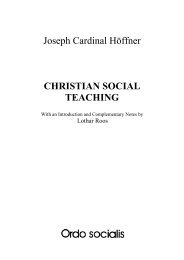Prof. Franz Josef Stegmann Bethlehem Social ... - Ordo Socialis
Prof. Franz Josef Stegmann Bethlehem Social ... - Ordo Socialis
Prof. Franz Josef Stegmann Bethlehem Social ... - Ordo Socialis
You also want an ePaper? Increase the reach of your titles
YUMPU automatically turns print PDFs into web optimized ePapers that Google loves.
<strong>Stegmann</strong><br />
tion of social conditions and objectives. The core of the model is the regulated competition<br />
that promotes and guarantees economic efficiency and productivity. The supporters of this<br />
model at the same time reject unlimited freedom in the marketplace, as well as the disregard<br />
for social elements and social responsibility that always characterises old or palaeoliberal<br />
capitalism. In comparison with classical economic liberalism, these European neoliberals<br />
proposed remarkable reforms. They realised, for instance, that absolute freedom can damage,<br />
cut down and even destroy competition, that competition has to be "established" and<br />
promoted by a strong state, and that important human needs and values cannot be left to the<br />
market. The state must safeguard competition by law, must compensate for socially negative<br />
results of the economic process by social policy, and must make necessary changes in the<br />
economic structure endurable by economic policy. Because of that, <strong>Social</strong> Market Economy<br />
in neoliberal terms and what I call Manchester Capitalism are fundamentally different, and<br />
<strong>Social</strong> Market Economy requires a powerful state. The essential difference between old or<br />
palaeo liberalism and neoliberalism might be described as Wilhelm Röpke, one of the<br />
founders of <strong>Social</strong> Market Economy, described it: "According to the palaeoliberal concept,<br />
competition was a natural plant" growing by itself; "according to our neoliberal conviction, it<br />
is a cultivated plant" 58 which must be tended, pruned and nursed.<br />
3. SOCIAL MARKET ECONOMY AND CHRISTIAN SOCIAL TEACHING<br />
How does Christian <strong>Social</strong> Teaching judge <strong>Social</strong> Market Economy in European neoliberal<br />
terms? First, I shall give a brief historical summary of the Catholic Church's attitude towards<br />
market economy. I will then point out main aspects of how <strong>Social</strong> Market Economy in the<br />
outlined neoliberal understanding is judged by Christian <strong>Social</strong> Teaching.<br />
3.1 The Catholic Church and Market Economy<br />
For a long time the attitude of the Church Magisterium towards competitive or market<br />
economy was reserved and cautious. "Free competition, though justified and quite useful<br />
within certain limits", the Encyclical Quadragesimo Anno of 1931 states, "cannot be the<br />
guiding principle of economic life". Some translations read: free competition "cannot be the<br />
ruling principle of the economic world" or "an adequate controlling principle in economic<br />
affairs", The Latin text states: "Liberuni certamen...rem oeconomicarum dirigere nequit -<br />
Free competition cannot direct the economy". lt is true, the Encyclical explains its statement<br />
in the sense that "unregulated competition" cannot he "a principle of self-direction". 59 But all<br />
in all, in the past the Church Magisterium was more or less reserved and sceptical towards<br />
market and competition as such.<br />
This attitude has changed greatly in recent years. I quote only a few voices: in 1985, Joseph<br />
Cardinal Höffner of Cologne - for many years <strong>Prof</strong>essor of Christian <strong>Social</strong> Teaching and<br />
then Chairman of the (German) Catholic Bishops, Conference - declared himself in favour of<br />
"a socially tempered, socially oriented market economic order". 60 The Pastoral Letter<br />
Centesimus Annus of 1991 judges "business economy, market economy or simply free<br />
economy… certainly in the affirmative" sense, if it is "circumscribed within a strong juridical<br />
framework which places it at the service of human freedom in its totality", Pope John Paul II<br />
58 Quoted according to Oswald von Nell‐Breuning, Trennendes und Gemeinsames in den Hauptrichtungen der<br />
Wirtschaftswissenschaft und Wirtschaftspolitik. in: Grundsatzfragen der Wirtschaftsordnung' Berlin 1954. 215‐<br />
231, 218.<br />
59 Pius XI, Quadragesimo Anno (1931), No. 88.<br />
60 Joseph Cardinal Höffner, Wirtschaftsordnung und Wirtschaftsethik. Richtlinien der katholischen Soziallehre.<br />
Bonn 1985, 41.<br />
26















